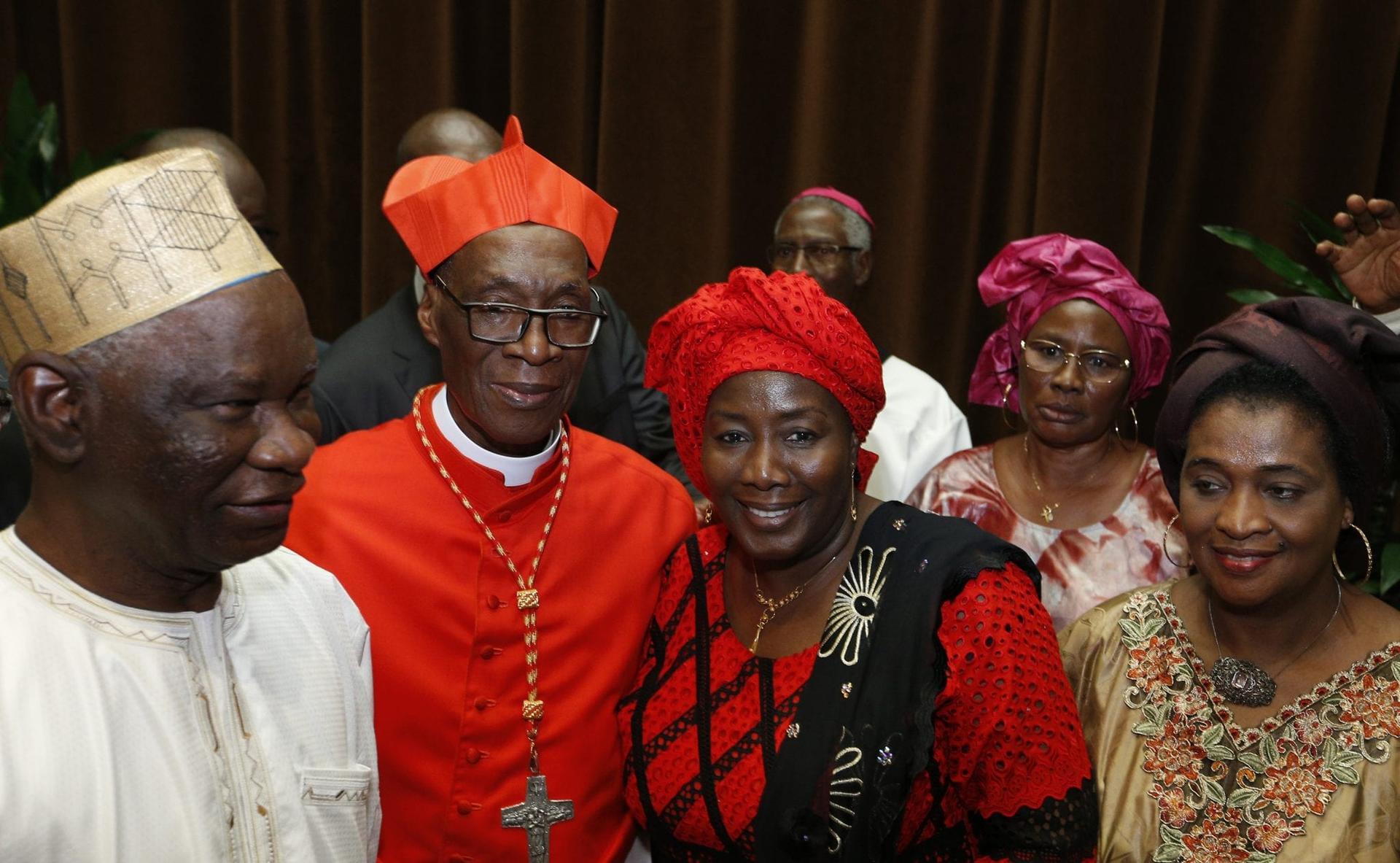ROME — The Catholic Church’s five new cardinals received a warm reception from family, friends and the general public June 28 after Pope Francis inducted them into the College of Cardinals.
The atrium of the Vatican audience hall, where the reception was held, is air-conditioned, but the Rome heat and the press of well-wishers quickly diminished any hint of cool air.
Before the public was let into the atrium, Laotian Cardinal Louis-Marie Ling Mangkhanekhoun of Pakse, sat quietly alone. Asked what it was like to become a cardinal when he had been ordained to the priesthood in a refugee camp and spent three years in a communist prison, he said it was just the next step in his life, which “will continue in the same way.”
The cardinal’s red clothes, he said, do symbolize a willingness to suffer for the faith, but for him, “red also means love.”
A long line of well-wishers was on hand to greet Sweden’s first ever cardinal, Cardinal Anders Arborelius of Stockholm. One of the first to greet him was Lutheran Archbishop Antje Jackelen of Uppsala, head of the Church of Sweden.
In Sweden, where about 60 percent of the population has been baptized Lutheran and just over 1 percent is Catholic, “the general tone has been one of joy” over the news of a Swede being named a cardinal, she said. Especially since Francis visited last October for an ecumenical commemoration of the 500th anniversary of the Protestant Reformation, Christians increasingly realize “we are one body, and if one member is honored we all can rejoice.”
In a society where so few people go to church and where “faith is so criticized,” she said, “we are in one boat together. We cannot afford to think something good happening to one is bad for us, and that’s deeply un-Christian as well.”
Arborelius told Catholic News Service that precisely because of its small size, the Catholic community in Sweden is strong. “Those who remain and want to be Catholic in Sweden, they are really faithful.
“In this secular atmosphere, you have to have a very personal faith,” because the culture does not support belonging to a church and, even less, practicing a faith, he said. “They want to be Catholic; that is why they are there.”
On the eve of receiving his red hat, Spanish Cardinal Juan Jose Omella of Barcelona told reporters that Francis’s habit of looking to the peripheries for new cardinals meant becoming a cardinal was the furthest thing from his mind.
People must realize how the church outside of Europe is growing, he said. “It is not we, Europe, who are the navel of the world.”
While Europe has played a significantly weighty role in the development of Christianity, the cardinal said, “now we see how the church is growing in numbers in Latin America, in Africa and in Asia. The pope is making this clear. This universal character of the church is very beautiful.”
Vatican security tried to keep the media from bothering Cardinal Jean Zerbo of Bamako, Mali, after speculation that he might not attend the consistory amid media reports that he and other Mali bishops had Swiss bank accounts worth millions of dollars.
Gabriele Avanzi, who works with a small group of Italian Catholics supporting projects in Africa, including Mali, told CNS he has known the cardinal for 30 years and is convinced the stories are false.
“He is simple, positive, hardworking and loves his people,” said Avanzi. “It would be just impossible for someone with all that money to live in the poverty he lives in.”
Standing at the back of the atrium was Manuel Roberto Lopez, El Salvador’s ambassador to the Holy See. Wearing a colorful sash and several medals bearing the blue and white colors of the Salvadoran flag, the ambassador beamed with pride as Salvadoran Cardinal Gregorio Rosa Chavez greeted people.
“The truth is I feel just how I look: very happy,” Lopez told CNS. “It is a joy that comes from the heart because it is truly a historical event, the fact that a cardinal from El Salvador has been named. We never expected it!”
Cardinal Rosa Chavez’s elevation to the College of Cardinals, he said, is in keeping with Francis’s call for Christians to “be surprised by God.
“This was a surprise not just for me, but for all of El Salvador, for all of Central America, for all of Latin America and for the world,” he said. “That this small country where a great light has risen — which is Blessed (Oscar) Romero — now the pope has turned his gaze toward us, toward the country, and first gave us the beatification of Bishop Romero in 2015 and now a cardinal that we never expected.”
Lopez told CNS that the new cardinal’s close relationship with Blessed Romero instilled in him the same simplicity and humility the martyred bishop was known for and that the new cardinal displayed in his 35 years as auxiliary bishop of San Salvador.
The unusual circumstance that Archbishop Jose Luis Escobar of San Salvador will have a cardinal as an auxiliary bishop “doesn’t mean anything because the archbishop of San Salvador is excellent. He is a great archbishop,” Lopez said.
Cardinal Rosa Chavez echoed the ambassador’s sentiments. “This isn’t a sign of authority,” he told CNS. “I will continue to be the auxiliary bishop of my archbishop, Archbishop Jose Luis Escobar.”
He also had a message for Salvadorans living in the United States: “We are with them, especially in this time where there are many difficult situations. We need to build bridges, not raise walls,” he said.












